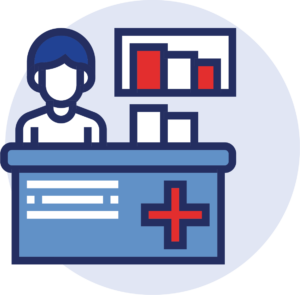Counterfeits in the provider’s office
Consumers should ask about the sources of the drugs being administered in their health care provider’s office.
Consumers should ask about the sources of the drugs being administered in their health care provider’s office.
Some medications must be given directly by a health care provider in an office setting, such as drugs that must be injected into an eye or a joint space, or those given intravenously (through a vein). Examples include:
Always ask about the authenticity of the treatments you receive from health care provider’s offices or outpatient settings.

In 2015, the Food and Drug Administration (FDA) issued a warning cautioning consumers of a counterfeit version of BOTOX® found in the U.S. market. The fake BOTOX® highly resembled its legitimate counterpart, produced by the drug manufacturer Allergan, and was reported to have been sold to doctors’ offices and medical clinics nationwide.
Don’t assume medications you receive directly from a doctor are safe. Use these tips to stay safe.
Research the provider’s credentials
Only choose health care providers that are board-certified because they have the additional training and expertise needed to keep you safe.
Ask about the provider’s experience
Patients should ask their provider how experienced and comfortable they are in performing the procedure. Makers of some injectable drugs, like BOTOX®, offer a directory of providers who are experienced in administering the treatment.
Don’t hesitate to ask to see the packaging
Patients have the right to ask their provider to see the packaging of the product. Authentic products typically have the following components: Lot number, expiration date, manufacturer information, and an identifier like a “holograph” on the label.
Avoid bargains
Deals and prices that “seem too good to be true” may indicate fake products or a dangerous supply chain.
Pay attention to the office setting
Avoid any non-clinical settings to receive injectable treatments, which include medspas or in-home environments, such as “Botox parties.”
Monitor your symptoms
Pay attention to any adverse symptoms you experience. Consult a licensed health care professional about any concerns. Treatment may be necessary if you have received a counterfeit medication. For example, in some situations, dermatological fillers can be removed by a professional with an injectable treatment that dissolves the product. Patients who have increasing concerns should follow up with a board-certified dermatologist or plastic surgeon, as well as their primary care provider.
Fraud.org is a project of
The National Consumers League.
info@nclnet.org
(202) 835-3323
1701 K St NW
Suite 1200,
Washington, DC 20006
© Copyright 2026. All rights reserved.
